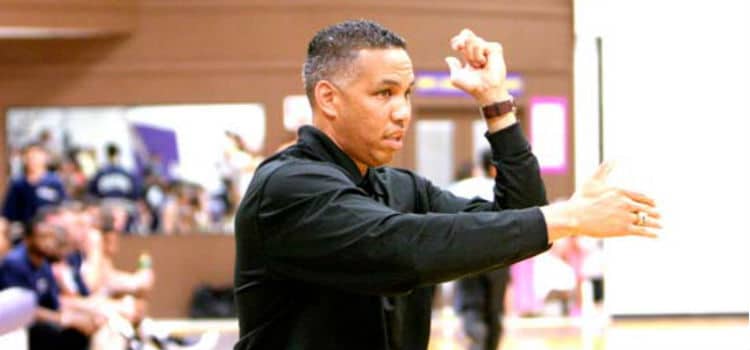
Kevin Sutton contributed to this portion of the article.
This basketball coaching article was written by Georgetown University assistant men’s basketball coach Kevin Sutton. Kevin has over 25 years of coaching experience at the college and high school levels and has worked with hundreds of division 1 and professional basketball players.
Coach Sutton has also recently produced an eBook with some of his best basketball drills in it. The Multiple Effort Offensive and Partner Scoring Drill eBook will help your players reach their maximum potential and really help to improve your overall team play. The eBook has over 20 different drills in it. Check it out today!
Thoughts on Leadership
I was having a conversation with one of my “Living Trophies” – Nate James, an assistant coach at Duke University, the other day. One of the topics we discussed was Leadership. Interestingly enough, Nate was one of the best leaders that I ever coached. Now he wants to be a great leader as a basketball coach. He will be!
Great Basketball Teams and Organizations Have:
- A Visible Bond
- Chemistry
- Synergy
- Trust
- Communication Skills
- Respect
- Accountability
- Honesty
- Love for Each Other
- Confidence
- A Toughness
- Maturity
- Alliance
- Awareness of Who They Are, What is at Stake, and the Magnitude of the Moment.
- Conflict Resolution Skills
Leadership is not a “sometime thing” it is an “all the time thing.”
Leadership has to be addressed daily. It must have a level of reinforcement, either positively or negatively.
Leadership is about consistency.
People will follow if:
- They trust the leader.
- They believe in the leader.
- They know that the leader is consistent in his actions and words.
Great leadership has 3 types:
- Vocal
- Example
- Combination of Vocal and Example
Leadership has to be born out of a “Safe Environment” where the:
- Lines of communication are open.
- Trust is valued.
- Honesty is important.
- Accountability is expected.
- Collective responsibility to the team’s goals is paramount.
Leadership is an “Action” position. To lead, you must:
- Act on your instincts
- Speak and mean what you say
- Do what you say
An essential part of Leadership is “followship.” Followship is the willingness to be lead because you “believe in” the leader, which leads to “buy-in.” Followship is about trust.
It is important to create leadership/followship opportunities as often as you can:
- Rotating your leaders in your basketball drills during workouts.
- Make different people leaders in different aspects of your program (example – scout team, team outreach, etc.)
Final Thoughts on Leadership in Basketball
- Every person is a leader, first to himself and then to others.
- A leader is a person who has heard the call to lead and to step up and has chosen to answer that call.
- A leader’s willingness to fail is often overshadowed by their fear of failure, which often propels them to victory.
- Being a leader can be a lonely position. One must fill their own bucket by knowing that whom they lead and what they lead are moving in the desired direction.
- Leaders need to have vision. They must sell their vision. Their vision will get others to want to follow.
Leadership Within Your Basketball Program
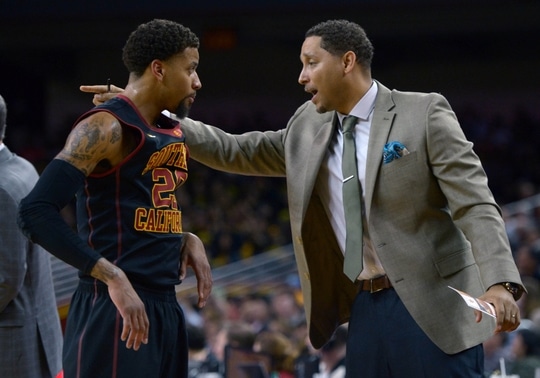
Tony Bland contributed to this portion of the article.
Leadership
Successful basketball teams and programs are comprised of many different things. Talent always seems to circulate in every successful program, but so does great leadership. The head coach will always set the precedent for leadership within a basketball program. Even with great leadership at the top, the rest of the program’s character and leadership qualities are equally important.
The character of the kids you bring into your basketball program must be consistent with leadership. Not everyone is a natural leader or wants the responsibility that comes with it, but will they challenge the precedents set by the leadership in place. In a basketball program, leadership must come from two places; Coaches and Players.
Basketball Coaches
Leadership coming from coaches sounds obvious, right? Every coach is a leader. Unfortunately, that’s not the case. We all know that the head coach is the most glaring example in the program concerning leadership, but assistant basketball coaches, in many cases, spend more time with the players.
Everyone wants to be liked, but what examples are you condoning as a basketball coach/leader? Do you joke with your kids about it being cool to miss a class? As a basketball coach, do you show up to practice on time every day? What kind of energy or body language do you have at practice? We all want our kids to provide energy at practice, but as coaches, what kind of “juice” do we have daily? The second we break the example of what is demanded from our kids, the leadership amongst them will take a step back.
Basketball Players
Leadership amongst players is where good basketball teams separate themselves. Coaches can only spend so much time with the players. This is where the character of the kids you bring in is vital! When they are on their own, what kind of message is being spread? Are all of the players commiserating with each other, or do they hear the truth from their peers?
Every successful basketball team has a solid foundation. The players don’t tolerate being late, excuses, not working hard, or not being committed to winning. If and when you have this on your basketball team, you can sleep well at night as a coach, knowing what you believe in is being instilled into your guys when you’re not around.
Everyone is a Leader
Leadership amongst the coaches and then the players is imperative, but it stretches beyond that too. Team managers play an important role in any basketball program, and the leadership amongst them should be tight. They spend time with the players and need to have the team’s best interest in mind when around them.
This should come from someone on staff. The strength coach should also be a leader. Is your team getting after it once they hit the weight room, or do they just get through the workout? He/she should carry out your vision in that regard.
Leadership always starts at the top, but leadership is found throughout if you ever study a successful program. Your mentality and beliefs as a coach should permeate through every division of your program. The saying “You are only as strong as your weakest link” is true in so many ways, whether it be business or sports. The type of people you keep around is important, and everyone must be committed to the same goal.
Ten Ways to Transform Your Basketball Players Into Team Leaders
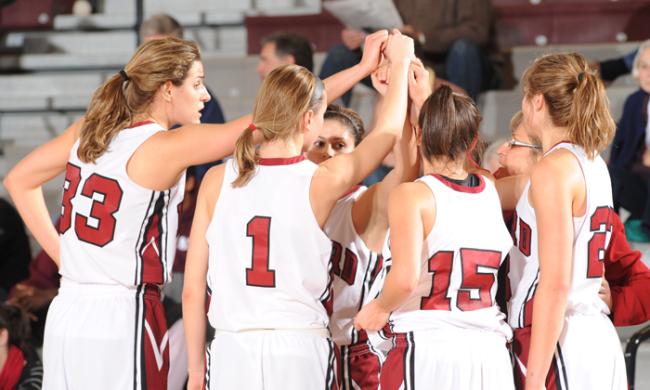
Sean Glaze contributed to this portion of the article.
In addition to teaching the X’s and O’s of their sport, every basketball coach is tasked with finding a way to transform at least a few of their basketball players into leaders. Below, I share ten ways that you can do that, and I would argue that this job, if you are a coach or leader in any arena, is even more important than the teaching of techniques or strategy.
Without peer leadership, a team facing adversity will often lean on a crutch of excuses or finger-pointing. It will either lose focus or begin listening to negative voices on the periphery of your team.
Often, the most valuable voice a basketball team can have is that of an athlete committed to success and who helps to keep his or her teammates on the same page, working together with intensity toward the same goal.
A great basketball coach or leader in any field is first and foremost interested in developing the people around him. As Tom Peters has said, “Leaders don’t create followers, they create more leaders.”
But Leaders are not created in a classroom…
You must give them time and provide them with the tools and opportunities to grow into that role.
As a basketball coach or leader, before you start reading the ten ways for you to transform your basketball players into team leaders, I think it is first necessary to define what a good leader is or does in your organization.
The more specific you are in your definition, the easier it will be for your athletes to live up to those expectations. And be careful not just to list adjectives. A quality and thorough definition of good leadership should also include a list of behaviors that would be evidence of those traits.
Once you have your detailed definition ready, then you can share it with the individuals you want to develop into leaders and begin working through the following ten ways to transform your basketball players:
Have Your Basketball Players Keep a Journal
This can be a journal for recording their thoughts over a season or one that records specific measurables from past performances. Numbers never lie – and it helps to have a record to identify reasons for strong growth or a performance plateau. There is tremendous value in maintaining a diary of knowledge that has been collected through many experiences. If they do not have time for reflection, they do not have time for improvement!
Increase Your Basketball Player’s Opportunities for Skill Building
Basketball players need to work on individual skills – and you want leaders to lead with actions and words. There must be a consistent and required time for focusing on building the skills which will be essential to ensuring their success. This discipline will lead to better individual performance and act as an example to others of positive and successful behaviors.
Create a Plan for Your Basketball Player’s Future
Jeremiah 29:11 says, “For I know the plans I have for you,” declares the Lord, “plans to prosper you and not to harm you, plans to give you hope and a future.” Every athlete (or teammate) wants to know that the skills and experience they are gaining will be useful in the future and will benefit tremendously from considering where their path may lead and what their daily behaviors are doing to contribute to that future.
Encourage Your Basketball Players to Make (and Own) Their Mistakes
Leaders realize that making mistakes is how we learn (and wise leaders learn from others’ mistakes). As Coach Dean Smith of the UNC Tar Heels said, you should “admit it, learn from it, and then not repeat it.” Great leaders take responsibility for their actions and decisions – and it is their positive response to mistakes and adversity that makes great leaders such a powerful example to their teammates.
Assign a Younger Person for Your Basketball Players to Mentor
John Maxwell has famously said that “Leadership is influence.” Putting your athlete in a position where he or she has the opportunity to shape and impact the lives and perceptions and visions of others positively is a powerful tool… and once he/she discovers how much influence their efforts and advice can have on a younger person, they will likely recognize and take advantage of more chances to speak up and lead your basketball team.
Have Your Basketball Players Research Your Organization’s Past
There is nothing like the feeling of being a significant and contributing part of something bigger than yourself. Giving your athlete a perspective on who has come before and the foundation that their efforts have helped build can provide a valuable sense of belonging to something larger. All great basketball players or achievers recognize and respect the adversity and accomplishments of those who came before and learn from the lessons and examples they offer.
Request Your Basketball Player’s Advice and Ideas
One of the greatest compliments you can give another person is to sincerely ask for and act upon their advice. If you are grooming someone for a leadership position, then having them feel that their opinion and insights are valued and will impact your program are key ingredients to their increasing sense of ownership and influence.
Share Important Big-Picture Information With Your Basketball Players
The more information you share with your basketball players, the more involved and invested they will usually become. Some coaches still take the position that most things are on a “need to know” basis, and their player’s job is just to show up and play. This leads to an employee mentality among your athletes instead of encouraging them to take ownership and feel included in the process. The more they know about the big picture plans of strategy, the why behind your practice planning, the need for fundraising, or the importance of defining team roles and responsibilities, the more they will likely feel a necessary part of making sure those things happen.
Give Your Basketball Players a “Shield” of Confidence
For Romans to lose or throw away their shields was a crime punishable by death because of the value of those body-length shields. If you’ve ever seen Gladiator, you know how big those things were. In Ephesians 6.16, Paul references the “shield of faith…” Even in difficult times, a leader should remember to NEVER “throw away/lose” their confidence/faith. Poor leaders allow circumstances to affect their commitment… but great leaders are determined to have their commitment impact their circumstances!
Expose Your Basketball Players to Other Leaders
The ugly duckling only felt ugly because he was a swan surrounded by ducks. Often, one of the greatest gifts you can give an athlete with leadership potential is to send them into situations where they will “see other swans” and see that they are not alone in having greater abilities or aspirations than some of the people that may surround them in day to day situations. Whether it is a basketball camp, a conference, or simply a visit to observe successful athletes at the “next level” of competition, all leaders need examples to emulate and will benefit from feeling that they are not alone in their commitment to excel.
Basketball Coaching Leadership: 5 Proven Strategies To Grow
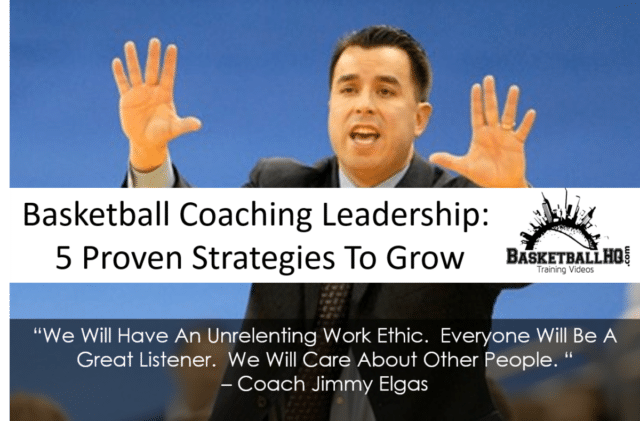
Jimmy Elgas contributed to this portion of the article.
Can You Strengthen Your Basketball Coaching Leadership Skills?
As people in coaching leadership positions, we have a great responsibility to those around us. We have a responsibility to be a leader in all walks of our life. It comes with the territory. But for all of us, being a leader is very difficult as we are faced with daily challenges, obstacles, and sustaining our energy daily can be difficult.
The following is a day to day leadership checklist that we try to keep in mind throughout our basketball program to boost our ability to lead those around us.
Establish (And Stick To) Your Core Values and Pillars of Belief
Knowing what you believe in and what you stand for is so important in being a leader. These values or pillars of belief are the cornerstones of everything. They will help you determine how you think, what you emphasize daily, and most importantly, these core values allow you to make decisions.
Whatever comes up in your program or organization, decisions become easy when you keep in mind your pillars of belief.
Unrelenting Work Ethic: In our basketball program, our 3 core values or pillars are posted and emphasized every day and are first, having an unrelenting work ethic. Working hard starts with me as the head basketball coach, filters to our assistants, and then down to our players. We cannot accomplish anything without working hard.
Great Listener: Secondly, everyone in our program is going to be a great listener. Especially in today’s day and age, where communication is done through our phones, on social media, all with our heads down into our own individual world. Listening has become a lost art. Listening requires your attention, shows respect, and allows you to connect more deeply.
Care About Other People: Our third and final core belief is we will care about other people. Obviously, caring about others includes our family and those within our program, but it also includes everyone else we come in contact with. Our teachers, fellow students, coworkers, and even those we may not know very well.
Keeping in mind our program’s core values and recognizing them everyday help provide clear direction for our program.
Hold Yourself Accountable to Those Values/Beliefs
The adage of “Do as I say, not as I do” is no longer an applicable statement that today’s players will follow. Times have changed in our culture today, as the people we lead are observing our every move.
As human beings, we can all be prone to taking shortcuts. We can look for the easy way out. We can make excuses and let doubts creep into our minds. If the people we lead see us as leaders cutting corners in our own pillars of belief, they may ask the questions such as:
“Why should I work so hard if my coach is not?”
“Why should I care about others when I see this staff mistreat people around them?”
“Why should I listen to you when I needed you last week, and you did not listen to me?”
Therefore, to get our team to buy into what we are communicating to them, we try to practice what we preach. But it is tough for us. We need to be intentional in our thoughts and actions in staying true to our core values.
We will not always be perfect, just as those around us are not. But those around us can see if we are truly trying to be a living example of our core values or are merely paying lip service to those principles.
Strong Communication
There was a recent free event put on by author Jon Gordon called the Power of Positive Summit. Many different leaders across all types of professions put informational webinars that emphasized how to lead through the power of positivity.
During the Summit, former NBA and original Dream Team assistant coach Brendon Suhr asked the question, “How often do you meet with your organization every year?” After contemplating an answer, Coach Suhr said that the year his organization won an NBA championship, their coaching staff met 2,800 times! All for one reason, to communicate.
They wanted to make sure that everyone was on the same page and that the same message was being communicated throughout the organization.
Constant communication is so critical to have with your team. Obviously, your players interact with those they come in actual physical contact with throughout their day. But in addition to those in-person interactions, players are bombarded with additional voices, thoughts, images, and videos made by other people.
They interact with thousands on Snapchat, Periscope, Twitter, etc., and consequently have so many different voices they can listen to. What differentiates us, as basketball coaches, from the other people that they may be listening to? Frequency, specificity, quality, and intentionality have to be at the forefront of your communication with your players.
Constant Communication: They must hear your voice constantly, directly from you or from your coworkers. Everyone must speak to the same beliefs that are core to your organization.
Specific Communication: You must be specific, get right to the point of what you are trying to convey to them as their attention span is not long (see how long a vine, snap chat, or IG lasts!).
Quality Communication: There must be substance or quality to your communication.
Attentive Communication: Your players deserve your 100% attention, so do not text, type an email or talk on the phone when dealing directly with one of your players. Make them understand they are essential to you by giving them all of your attention when communicating with them.
Intentional Communication: Finally, knowing what is going on in your player’s lives, knowing when they are struggling, wishing them good luck on a test or a happy birthday can go miles in having intentional communication with them.
The stronger your communication, the stronger the relationship you will build with your players, and ultimately the stronger the relationship, the better chance you have to lead your players.
Have a Human Element as a Basketball Leader
Dr. Jeff Duke, in his book, 3D Coaching, emphasizes the importance to “Allow players to see coaches away from the sport and personalize that relationship.” It is easy in today’s day and age to take ourselves too seriously. We can find ourselves barking out orders, firing out emails, and creating to-do lists for those around us to complete.
While these are all certainly necessary elements of our profession, we must recognize those around us need to see us as truly human. One way to accomplish this is we must admit our mistakes. While our hearts are always in the right place, we are far from perfect coaches, and we are prone to making mistakes (I make more mistakes than anyone reading this article!).
When we recognize our mistakes in front of those we lead, they see us differently. The players see that even the leader of the organization makes mistakes, and they also see we are ACCOUNTABLE to those mistakes. Once WE demonstrate accountability, then we can hold our players more accountable.
We can drive them harder to improve and get better, which is all our ultimate goal: to watch our players grow.
Other examples that we can have a more human element to our leadership are laughing at ourselves, spending time with our players outside of our work environment, and having conversations about things outside of basketball. It has been our experience that those around us feel a stronger connection to their leader when they see us in a more human light.
Self Study, Self Improvement, Self Evaluation
Yogi Berra once said, “Life is a learning experience, only if you learn.” You can never stop looking for ways to learn, improve, and evaluate yourself. It is sometimes difficult to carve out time for yourself, but the minute you become stagnant is when your organization will stop growing.
There are so many ways you can look to improve yourself. Look to attend conferences or basketball coaching clinics to help you better understand the game. Leave your campus and watch another team or organization for a practice or a day and see how they operate.
Pick up the phone and communicate with other individuals in your profession, and bounce ideas off one another. Call one of your former mentors and communicate with them about how things are going in your life (may as well thank them while you have them on the phone!).
Read books, study historical figures, start a diary, etc., as there are many ways to get better as a person. One of my favorite books that I have read recently is “LEAD…for God’s Sake” by Todd G. Gongwer.
It is the story of an ultra-competitive basketball coach who learns many valuable truths about leadership, success, and relationships LATE in his coaching career! We are always asking those around us to improve and get better, so doesn’t that mean we should too?!
Speaking on a personal note, the number one way that I have really grown as a person and ultimately as a leader is by growing stronger in my faith. My faith is helping me develop important character traits; it helps me prioritize the important things in my life and is strengthening so many of my relationships.
Explore ways to help yourself grow. Self evaluate where you need to improve because any self-improvement allows you to mature as a person, which will help you become a better leader in the long run.
Being a leader as a basketball coach is hard. It takes intentionality. It takes endurance. It is a process. But what we hope is these small things like sticking to our core values, holding ourselves accountable to these values, being in constant communication with those around us, having a human element to our leadership style, and always looking for ways to improve ourselves are some ways that you can have some success in boosting your leadership when coaching your team.
Great Basketball Coaches and Leaders
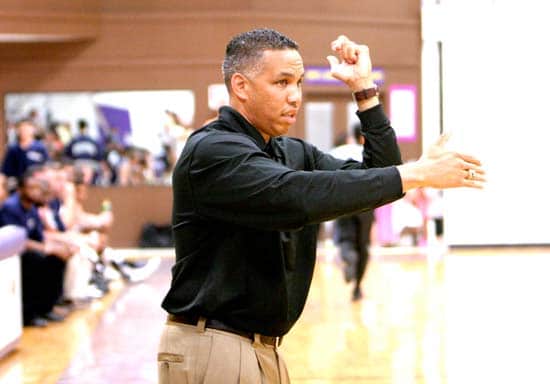
Kevin Sutton contributed to this portion of the article.
Great basketball coaches and leaders have multiple characteristics that earn them the right to these titles. It is not a self-imposed title but one earned by demonstrating the actions that go along with being a great coach and leader. Here are ten different ways that you can improve as a leader and a basketball coach.
I. Know how to manage and lead different personalities well:
A. They create an atmosphere where opinions are welcome.
B. They allow for ownership of the team to be shared without sacrificing the whole for its parts.
II. Know that their egos must come last:
A. They understand the importance of the proverb, “A candle loses nothing by lighting another candle, but creates twice the illumination.”
B. They know that when one person on the team has success, we all have success.
III. Are great at communicating:
A. They understand the many different forms of communicating: verbal, non-verbal, written, email, Twitter, Facebook, etc.
B. They have the ability to clearly and consciously articulate the mission, vision, objective, and strategy of their basketball program or company that will lead to success.
IV. Treat their staff and everyone affiliated with their program with respect and dignity:
A. They take the time to get to know their people on a personal level.
B. They foster a family atmosphere.
V. Have a thirst for knowledge, learning, and teaching:
A. They are willing to learn different ways to do their job better and experiment with new methods, even if their old ways are proven to work well.
B. They are constantly asking questions.
C. They try to stay on the cutting edge in their profession.
D. They use every opportunity to teach. “Teachable Moments” are when they shine the brightest.
VI. Have a tremendous “feel” for their profession or craft:
A. They know whom to play, when to play them, and for how long.
B. They understand and embrace “the moment.”
C. They respect the past, are “present” in the present, and are eager for the future.
VII. Are innovative thinkers:
A. They embrace “outside the box” thinking.
B. They have the ability to read the “tea leaves” and make appropriate changes while anticipating situations several moves ahead.
C. They are a part of governing bodies that are changers of their game, business, or industry.
VIII. Have a philosophy for their coaching and leadership style:
A. They develop philosophies over time through trial and error in coaching basketball. The philosophies are created by years of experience and through the observations of other programs and organizations.
B. They analyze the strengths and weaknesses of previous programs or organizations they have worked to create their philosophy.
IX. Nurture and grow new leaders:
A. They create an environment where growth can and must occur.
B. They often will play “devil’s advocate” to teach a person how to define their belief on an issue, idea, or rule.
C. They don’t want all “yes men” because they are confident enough to know that they are not always right. They understand that other people have great ideas too.
D. They understand the theory of “secure vs. insecure.” They understand you must freely share your knowledge to train the leader who will eventually succeed you (Moses trained Joshua, Elijah trained Elisha).
X. Build up instead of tear down:
A. They create a “safe environment” where asking questions to seek clarity is encouraged, and taking risks to inspire growth is applauded.
B. They live by the proverb “give a man a fish, you feed him for a day. Teach a man to fish, you feed him for a lifetime”.



